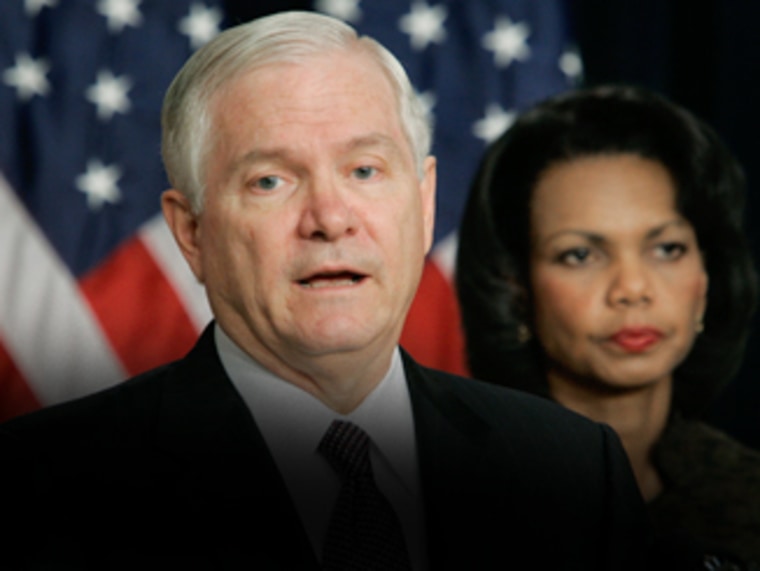With more than 140,000 U.S. troops still in Iraq and another 34,000 fighting in Afghanistan, the upcoming election marks the first time in 40 years that a new president will take office during a time of war.
Not since 1969, when Richard Nixon was elected in the midst of fighting in Vietnam, has a new administration entered the White House with the immediate responsibility of commanding U.S. troops involved in overseas combat.
And that responsibility will fall on one of two men: Sen. Barack Obama, who is promising to pull one-to-two troop brigades out of Iraq each month, or Sen. John McCain, who pledges to craft a more conditions-based withdrawal timetable.
New and ongoing challenges
On January 20, 2009, the next secretary of defense will arrive at his or her office in the Pentagon E-ring with a full plate of security challenges facing U.S. military forces. But whatever the outcome, military officials are already working to make that transition as smooth as possible.
In addition to managing the conflicts in both Iraq and Afghanistan, there are already several major Pentagon initiatives underway, including:
- Modernizing and transforming the U.S. military to fight a more a more irregular, insurgent type of enemy.
- Rebuilding and resetting a ground force strained by years of sustained and deadly combat.
Military analyst Loren Thompson says those projects, which are "in mid-stream and must be continued," will likely top the next secretary's agenda. Other priorities may include the development of the 2010 defense budget and the creation of a new strategy for dealing with Guantanamo Bay detainees.
To ease the transition, and to prevent handover problems this fall, Defense Secretary Robert Gates has asked many Pentagon appointees to prepare to stay in their jobs, should they be asked to do so by the new administration.
Gates says the continuity of Pentagon management is critical, "so we don't have a lot of empty seats on the civilian side of the government in the middle of a war."
Typically, a new defense secretary brings in his or her own team of undersecretaries, deputies and senior staff. They form the nucleus of the secretary’s leadership team, and often must be confirmed by Congress — a process which can take months.
Seeking to head off any delays, Gates has directed the Defense Policy Board to pinpoint ways to speed up that process.
Gates, who has said he intends to retire once President Bush leaves office, believes that the process of vetting, nominating and confirming top Pentagon officials can be slow and cumbersome.
Gates recently called the process a "real problem," saying "it's gotten worse with every presidential transition over the past 20 or 25 years.”
Thompson agrees, saying the transition process hasn't kept pace with the accelerated tempo of today's military operations.
Ready on day one
In addition to asking the policy board to shorten the time it takes to get leaders in place, Gates wants the group to identify critical issues that a new defense chief will have to "know about and be ready to deal with on day one."
"It's obviously Iran, Iraq and Afghanistan," Gates says, but also, "longer-range issues that may not be a crisis on day one, but he or she is going to have to start addressing pretty quickly."
Gates says he wants to “make sure that we don't drop the baton in wartime."
If Obama is elected, Pentagon changes won’t only affect civilian leadership, but also the way that the Iraq war is addressed strategically. However, it’s unlikely that the day-to-day management of the war would be compromised during any transition period.
Just back from a fact-finding trip to Iraq, Michael O’Hanlon, a military analyst with the Brookings Institution, says the new defense secretary will be able to immediately rely on the advice of top U.S. commanders General David Petraeus and General Ray Odierno.
In addition, assuming that violence in Iraq remains in somewhat of a lull, O'Hanlon says the new Pentagon chief will have “the luxury of inheriting an operation that's starting to have good logic for continued gradual reductions" of U.S. troops.
'Vigilance and preparation'
Still, Admiral Mike Mullen, the president's chief military advisor, is calling for vigilance and preparation when it comes to assisting the new Pentagon leadership.
Similar to Gates' plan, Mullen has directed the Joint Chiefs of Staff to form a "transition team" that, among other tasks, will "war game" potential conflicts around the globe.
Admiral Mullen warns, "the consequences of missing something like this are pretty significant."
"I believe there are vulnerabilities that we've got to pay attention to and we need to be vigilant."
Once the next president is elected, Mullen says he plans on presenting "a very real update of where we are in hot spots around the world."
In the meantime, because both candidates are senators, the Joint Chiefs Chairman is required by law to respond to their questions and requests for information.
Mullen says, however, he isn't planning on any direct engagement with either Obama or McCain until one of them becomes president-elect in November.
All this comes as military commanders await a new July recommendation from Petraeus on whether troop levels can be cut beyond the pre-surge level of roughly 142,000 troops.
So, it is possible that further troop cuts could already be underway before the next president and Pentagon team assume office early next year.
